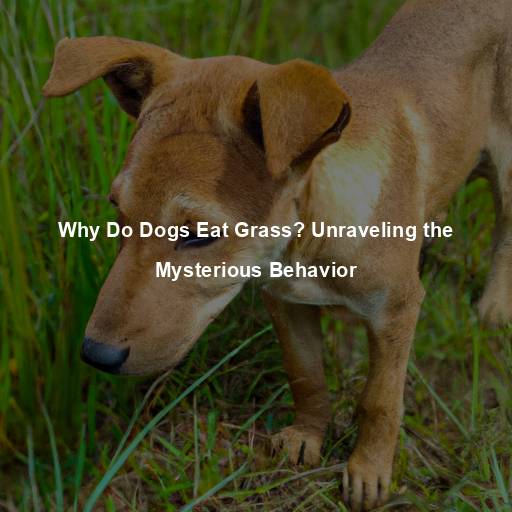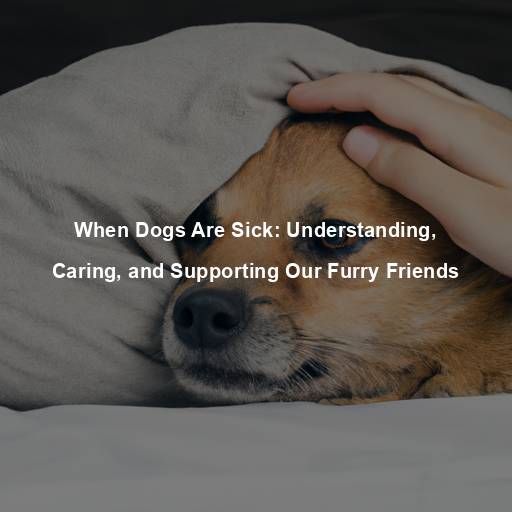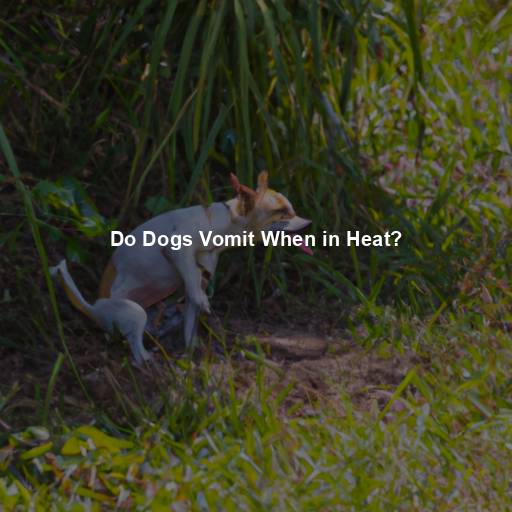Why Do Dogs Eat Grass? Unraveling the Mysterious Behavior
Last Updated on November 11, 2023 by Evan
Contents
The Curious Case of Canine Grass Consumption
Dive deep into the enigmatic world of our lovable canine companions as we unravel the perplexing phenomenon of grass consumption. These captivating creatures, so full of surprises, often leave us bewildered with their quirky behaviors. Among them, the puzzling habit of munching on grass takes the spotlight. Join us on this journey of exploration as we dig into the depths of this curious canine phenomenon and seek to understand the cryptic reasons behind this grass-grazing inclination.
The Grass-Eating Phenomenon
It’s no secret that dogs are natural scavengers with a diverse palate. From your favorite shoes to the occasional table leg, they seem to find joy in chewing on almost anything. However, when it comes to grass, the reasons behind this behavior are not as straightforward as you might think.
Instinctual Survival Mechanism
One theory suggests that dogs eat grass as an instinctual survival mechanism inherited from their wild ancestors. In the wild, canines would consume grass to induce vomiting, aiding in the removal of indigestible materials or parasites from their stomachs. While modern-day dogs may not face the same dietary challenges as their wild counterparts, this instinctual behavior could still be deeply ingrained in their DNA.
Nutritional Deficiencies
Another possible explanation for grass consumption is nutritional deficiencies. Dogs, like humans, require a balanced diet to thrive. If their regular diet lacks certain nutrients, they may seek alternative sources to fulfill those nutritional gaps. Grass, being rich in fiber, may provide dogs with additional roughage or other essential nutrients they may be lacking.
Boredom and Behavioral Stimulation
Dogs are intelligent beings that require mental and physical stimulation. When dogs feel bored or understimulated, they may resort to behaviors such as chewing on grass to alleviate their boredom. In such cases, eating grass may simply be a way for them to entertain themselves and engage in a natural instinctive behavior.
Upset Stomachs and Digestive Upsets
Have you ever noticed your dog eating grass and subsequently vomiting? This observation is not uncommon. Some experts believe that dogs may instinctively turn to grass when they’re experiencing digestive discomfort or an upset stomach. The grass may induce vomiting, helping them get rid of something that’s bothering their digestive system.
Behavioral Conditioning
In certain cases, dogs may develop a habit of eating grass due to behavioral conditioning. If your furry friend has had a positive experience after consuming grass in the past, such as relief from an upset stomach, they may associate grass-eating with a favorable outcome. As a result, they may continue the behavior even when there’s no specific need for it.
Environmental Factors
Environmental factors can also play a role in a dog’s grass-eating habits. For instance, if a dog spends a significant amount of time outdoors and has access to grass, they may naturally be more inclined to eat it. Similarly, the taste or texture of the grass in a particular area may be appealing to them, leading to increased grass consumption.
Possible Risks and Precautions
When it comes to our furry friends and their peculiar grass-eating habits, there are certain aspects that can leave us scratching our heads. While it is often believed to be harmless, it is crucial to consider a few factors to ensure the well-being of your beloved canine companion. By addressing the perplexing nature of this behavior and taking necessary precautions, we can create a harmonious balance between curiosity and caution, ensuring our dogs stay happy and healthy.
-
Pesticides and Chemicals: If you use pesticides or chemicals on your lawn, it’s important to prevent your dog from ingesting grass that has been treated. These substances can be toxic and pose a risk to their health.
-
Toxic Plants: Some plants, including certain types of grass, can be toxic to dogs. Familiarize yourself with the plants in your environment and ensure your dog avoids any potentially harmful vegetation.
-
Parasite Transmission: Dogs that eat grass in areas frequented by other animals may be at a higher risk of ingesting parasites or bacteria. Regular parasite prevention measures, such as deworming and flea control, are essential to safeguard their health.
When to Consult a Veterinarian
If your dog’s grass-eating behavior becomes excessive or is accompanied by other concerning symptoms, it’s advisable to consult a veterinarian. Excessive grass consumption may indicate an underlying health issue that requires attention. Additionally, if your dog regularly vomits after eating grass, experiences diarrhea, or displays signs of discomfort, a veterinary examination is recommended to rule out any potential problems.
Unraveling the Mystery, One Blade at a Time
In conclusion, the question of why dogs eat grass remains partially unresolved. While instinctual behavior, nutritional deficiencies, boredom, and digestive upsets may contribute to this mysterious habit, there isn’t a one-size-fits-all explanation. As responsible pet owners, it’s crucial to monitor our dogs’ grass-eating habits and ensure their well-being. By understanding the potential reasons behind this behavior and taking necessary precautions, we can help our furry friends live happy and healthy lives, one blade of grass at a time.
Canine Ancestry: A Glimpse into the Past
Have you ever wondered why our furry friends, dogs, indulge in the unusual act of nibbling on grass? Well, it seems that we may need to take a journey back in time to unravel this leafy mystery. You see, dogs, being descendants of mighty wolves, their primal instincts remain deeply embedded within their DNA. Picture this: in the untamed wilderness, wolves and other wild canines would feast upon the stomach contents of their prey, which often included grass and vegetation.
Nutritional Benefits: The Grassy Greens
While dogs primarily rely on a balanced commercial diet, they may still seek additional nutrients that grass can provide. Grass is a source of fiber, which aids in digestion and can promote bowel regularity. Additionally, grass contains certain vitamins, minerals, and phytonutrients that may not be present in their regular diet. By instinctively munching on grass, dogs may be trying to supplement their nutritional intake.
Mental Stimulation: A Boredom Buster
Dogs, those fascinating beings of intelligence and curiosity, thrive on mental stimulation like no other. The absence of such enrichment can lead our furry friends down a bewildering path, where they might engage in behaviors that seem puzzling to us, like their fervent grass-eating pursuits. Surprisingly enough, this peculiar habit actually holds a hidden purpose, as it offers a dose of amusement and mental engagement, especially when our beloved canines find themselves in the throes of solitude or the scarcity of interactive pastimes. As guardians of these remarkable creatures, it falls upon us to ensure they receive an ample dose of mental and physical exercise, ensuring their minds and bodies remain captivated and content.
Digestive Aid: Nature’s Elixir
There’s this curious quirk that doggos have – they love to chomp on grass, leaving their hoomans puzzled. It turns out that this grassy affair might not be as perplexing as it seems. When our furry friends have a tummy ache or some digestive distress, they instinctively turn to this green goodness to find relief. You see, grass irritates their stomach, prompting them to retch out any pesky substances causing them discomfort.
Taste and Texture: A Matter of Preference
Dogs, like us, exhibit an intriguing palate when it comes to Mother Earth’s verdant offerings. Fascinatingly, our canine companions may cultivate personal predilections for various grass species, driven by factors as intriguing as texture and taste. Intriguingly, these discerning individuals might find solace in grazing on specific locales, be it the graceful allure of luscious, dew-laden blades or the captivating allure of nascent sprouts. By unraveling these enigmatic preferences, we gain the power to curate a harmonious and delightful milieu that ensures the well-being of our furry friends.
Unresolved Mystery: Individual Differences
Despite the various theories surrounding grass eating in dogs, it’s important to acknowledge that each canine is unique. What motivates one dog to eat grass may not apply to another. Dogs are complex beings with their own personalities, preferences, and health considerations. It’s crucial to observe and understand your individual dog’s behavior and consult with a veterinarian if you have any concerns.
Ensuring Your Dog’s Safety and Well-being
Creating a Pet-Safe Environment
As responsible pet owners, it’s our duty to create a safe environment for our furry friends. Here are some steps you can take to ensure your dog’s safety when it comes to grass eating:
Maintain a Chemical-Free Lawn
In a world where the use of pesticides is a growing concern, why not take a leap towards a greener and safer environment? By embracing the idea of a chemical-free lawn, you not only protect yourself and your loved ones from potential harm but also take a stand for the well-being of your pets. Opting for organic lawn care products or exploring natural alternatives might seem perplexing at first, but trust me, the burst of relief that comes with knowing you’re providing a safe haven for your furry friends is truly worth it. So, let them explore and graze to their heart’s content, without the nagging worry of harmful substances lurking beneath their paws.
Identify Toxic Plants
Familiarize yourself with the plants in your surroundings, including the grass varieties in your yard. Some grasses can be toxic to dogs, causing gastrointestinal upset or other health issues. Consult with a local gardening expert or veterinarian to identify safe grass options for your furry friend.
Provide Safe Grass Alternatives
Concerned about your furry friend’s unusual culinary habits? Look no further! We have just the solution for you. Introducing safe grass alternatives that will put your worries at ease.
Consulting with a Veterinarian
If you ever find yourself wondering why your furry companion insists on sampling the local flora, or if their munching habit comes with unexpected side effects, it’s vital to reach out to a knowledgeable veterinarian. By seeking professional guidance, you’ll receive tailored recommendations that align with your pup’s unique requirements and well-being. These experts can delve into any potential underlying health concerns and offer insightful strategies for addressing or redirecting this intriguing behavior.
Embracing Nature’s Quirks
In the vast tapestry of the animal kingdom, canines occupy a special place in our affections. Their charming idiosyncrasies, like grazing on grass, serve as a poignant reminder of their captivating essence and their ancestral connections to the wild. Although the precise motives behind this behavior may elude us, as pet guardians, it falls upon us to ensure their safety, well-being, and contentment. By embracing their innate instincts, comprehending their distinct needs, and fostering a nurturing environment, we can continue to commemorate the extraordinary bond forged between humans and their faithful furry companions.
FAQs – Why do dogs eat grass?
Why do dogs eat grass?
Dogs may eat grass for various reasons. Some dogs simply enjoy the taste and texture of grass. It can provide them with a sensory experience and act as a natural source of roughage. Additionally, grass contains certain nutrients that can be beneficial to their diet, such as fiber. However, not all grass is safe for dogs to consume, so it is important to monitor their behavior and ensure they do not eat potentially toxic plants or grass treated with pesticides.
Is eating grass harmful to dogs?
In most cases, eating a small amount of grass is not harmful to dogs. However, there are some precautions to consider. If the grass has been treated with chemicals like pesticides or fertilizers, it can pose a risk to their health. Certain plants can also be toxic to dogs, so it is essential to be aware of the types of grass and plants they have access to. If excessive grass consumption leads to vomiting, diarrhea, or other concerning symptoms, it is recommended to consult with a veterinarian to rule out any underlying health issues.
Does eating grass indicate an underlying health problem?
Have you ever wondered why your furry friend finds solace in munching on grass? While it may seem like a harmless habit, there could be more to it than meets the eye. In some cases, excessive grass-eating in dogs might be a red flag indicating an underlying health issue. So, if your canine companion starts gulping down blades of grass like there’s no tomorrow, accompanied by peculiar symptoms, it’s time to pay attention. From tummy troubles to nutritional deficiencies and even pesky intestinal worms, a vet’s expertise can shed some light on the situation.
Can I prevent my dog from eating grass?
It can be challenging to completely prevent dogs from eating grass since it is a natural behavior for them. However, there are a few measures you can take. First, ensure they have a well-balanced diet that meets their nutritional needs, as this may reduce their urge to seek additional nutrients from grass. Secondly, provide them with plenty of mental and physical stimulation to keep them occupied and distract them from grass consumption. Lastly, creating a safe and enriched environment with designated play and potty areas can limit their access to potentially harmful grass or plants.
Should I be worried if my dog vomits after eating grass?
It’s not uncommon to witness our beloved furry pals regurgitating grass from time to time, triggering a twinge of worry. Yet, fear not, for this sporadic occurrence is typically harmless. Canine companions often resort to munching on grass as a self-administered antidote to their queasiness or an effective means to expel bothersome substances irritating their delicate stomachs. However, heed caution and remain vigilant if your dog’s hurling episodes become alarmingly frequent, align with other disconcerting symptoms, or endure unrelentingly. In such perplexing scenarios, it’s always wise to reach out to a veterinarian promptly, ensuring no underlying health complications fuel this enigmatic behavior.







